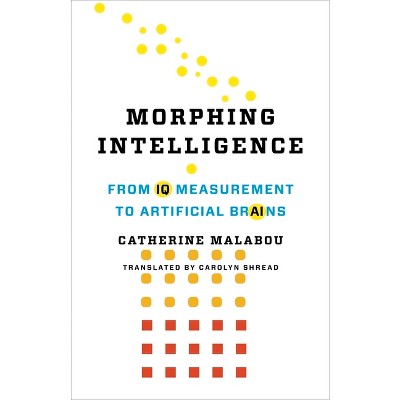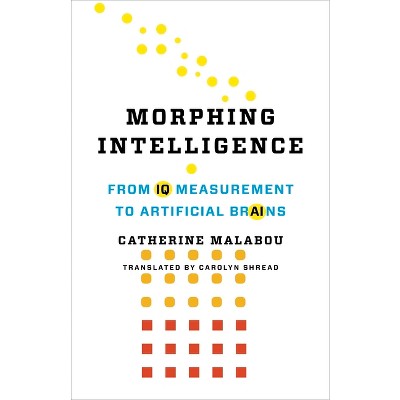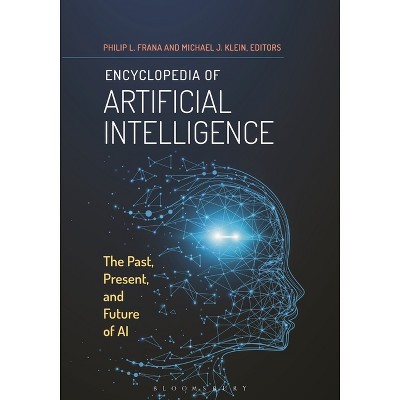Sponsored

An Artificial History of Natural Intelligence - by David W Bates (Hardcover)
$45.00
In Stock
Eligible for registries and wish lists
Sponsored
About this item
Highlights
- A new history of human intelligence that argues that humans know themselves by knowing their machines.
- About the Author: David W. Bates is professor of rhetoric at the University of California, Berkeley.
- 408 Pages
- Philosophy, Mind & Body
Description
About the Book
"What would it mean to make a decision against the acceleration of automation and for humanity? In An Artificial History of Natural Intelligence, David W. Bates lays the groundwork for such a decision by rethinking the history of human cognition and its entanglements with technology. Tracing evolving lines of thought from the early modern period to the present, Bates confronts the intimate connection between autonomy and automaticity in how we have understood the capacities of the human mind. At the heart of this entanglement is a total mechanistic understanding of nature that began in the seventeenth century and saw the body as machine, the nervous system as control mechanism, and the brain as the center of cognition. Reading varied thinkers from Descartes to Kant to Turing, Bates reveals how new ideas and experiences reconfigured the ways in which the automaticity of the body could be linked with technical systems, while at the same time the mind could still create the space for autonomy. The result is a new theorization of the human in which the human, dependent on technology, produces itself as an artificial automation that has no "natural" origin"--Book Synopsis
A new history of human intelligence that argues that humans know themselves by knowing their machines. We imagine that we are both in control of and controlled by our bodies--autonomous and yet automatic. This entanglement, according to David W. Bates, emerged in the seventeenth century when humans first built and compared themselves with machines. Reading varied thinkers from Descartes to Kant to Turing, Bates reveals how time and time again technological developments offered new ways to imagine how the body's automaticity worked alongside the mind's autonomy. Tracing these evolving lines of thought, An Artificial History of Natural Intelligence offers a new theorization of the human as a being that is dependent on technology and produces itself as an artificial automaton without a natural, outside origin.Review Quotes
"In this book, the history of human versus artificial intelligence begins with such figures as Descartes, Leibniz, and other thinkers of the seventeenth-century who wondered if thought could be mechanized and how machines could be designed to mimic human thought. . . Then come nineteenth-century developments with Babbage, Lovelace, machines with 'memory, ' and early studies of the brain when a reductionist biology enters the picture. . . . Drawing on Wittgenstein, Turing, and Leroi-Gourhan, among many others, the author discusses the 'immateriality' of thought, ideas form cybernetics, and recent interpretations of the mind-body problem."-- "Choice"
"An impressive and important book. Readers will learn much from the author's sensitive and insightful readings of the scientific and philosophical literature . . . But that does not mean that it is only for academic readers. The topic is too important. . . . As David W. Bates shows, we cannot remove ourselves from the world of technology; it is our world. But we can try to guide its evolution to protect the things we value. This is something we all need to think about, and An Artificial History of Natural Intelligence provides essential tools for the task."-- "Times Literary Supplement"
"As new forms of artificial intelligence throw us into turmoil, Bates invites us to think through the ever-evolving relations between human and humanish. Deftly weaving together cognitive science, intellectual history, and philosophy, he shows that we have for centuries measured ourselves against our self-simulating machines and reasserted our existence in the gap between the natural world (which constitutes us) and the artificial (which we constitute). It is the perfect moment for this book."--Jessica Riskin, Stanford University
"Historically astute and philosophically brilliant, this is the most ambitious, original, and important book on human-machine relations in thirty years. Bates surveys the entirety of the modern tradition since Descartes to demonstrate that there has never been a 'natural intelligence' to contrast with artificial intelligence and offers one convincing interpretation after another to force the reader to rework basic assumptions about technology, philosophy, and humanity. This is a tremendous achievement--intellectual history at its best."--Stefanos Geroulanos, New York University
About the Author
David W. Bates is professor of rhetoric at the University of California, Berkeley. He is the author of three books, including Enlightenment Aberrations: Error and Revolution in France.Dimensions (Overall): 9.2 Inches (H) x 6.0 Inches (W) x 1.1 Inches (D)
Weight: 1.45 Pounds
Suggested Age: 22 Years and Up
Number of Pages: 408
Genre: Philosophy
Sub-Genre: Mind & Body
Publisher: University of Chicago Press
Format: Hardcover
Author: David W Bates
Language: English
Street Date: April 2, 2024
TCIN: 1006100171
UPC: 9780226832104
Item Number (DPCI): 247-49-9543
Origin: Made in the USA or Imported
If the item details aren’t accurate or complete, we want to know about it.
Shipping details
Estimated ship dimensions: 1.1 inches length x 6 inches width x 9.2 inches height
Estimated ship weight: 1.45 pounds
We regret that this item cannot be shipped to PO Boxes.
This item cannot be shipped to the following locations: American Samoa (see also separate entry under AS), Guam (see also separate entry under GU), Northern Mariana Islands, Puerto Rico (see also separate entry under PR), United States Minor Outlying Islands, Virgin Islands, U.S., APO/FPO
Return details
This item can be returned to any Target store or Target.com.
This item must be returned within 90 days of the date it was purchased in store, shipped, delivered by a Shipt shopper, or made ready for pickup.
See the return policy for complete information.











